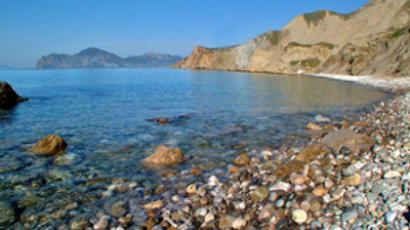Crimea: Ukraine’s trump card in game with Russia
The sleaze war between Ukrainian President Viktor Yushchenko and Prime Minister Yulia Timoshenko has been focusing its attention on the issue of the primarily Russian-inhabited and speaking Crimean peninsula.
Lately, the print media and e-Media controlled by the Bloc of Yulia Timoshenko, has been aggressively popularizing the idea that the Secretariat of Ukrainian president Viktor Yushchenko has been assaulting the state's institutions in order to assume power in the country.
According to “Obozrevatel”, a Ukrainian news-portal writing last week, the President’s secretariat has hatched a plan to recapture the reins of government. According to this plan, the following steps are anticipated:In the first instance, it is expected that, the constitutional court (which is pro-presidential) will confirm the absence of a functioning coalition.
The source, cited by “Obozrevatel” then predicts the dissolution of parliament, its refusal to carry it out and, ultimately, the take-over of power by the president to bring stability into the country.
Crimea
Crimea is the only autonomous republic of Ukraine. The primarily Russian-inhabited and speaking peninsula with the same name is located on the northern coast of the Black Sea. In 1783, Crimea was annexed to the Russian Empire as the result of war with the Turkish Empire. On October 18, 1921, the Crimean Autonomous Soviet Socialist Republic was created as part of the Russian SFSR (Soviet Federative Socialist Republic). With the collapse of the Soviet Union, Crimea became part of the newly independent Ukraine, a situation largely unexpected by its population, which was ethnically and culturally Russian for the most part.
The first target of the ‘orange counterrevolution’ was naturally the autonomous republic of Crimea.The Mass media, that advocates the interests of Timoshenko’s supporters, do not hesitate to share their resources with the Communist party of Ukraine that has been all along criticizing the plans of Yushchenko’s team to introduce direct presidential government in the autonomous republic, by imposing a special ‘public administration’ as a part of the blueprint for constitutional reform.
Earlier, Timoshenko continuously said that “the government would not let the tensions in the Crimea escalate, including the issue of Russia’s Black Sea Fleet based in the region."
Kiev is already actively trying to put its people in top positions in the autonomous republic, by appointing the chief of Crimea’s police without an accord with the Crimean parliament, as is demanded by the constitution of the autonomous republic.
Also, Yulia Timoshenko’s Bloc claims that the ‘shadow’ division of land in Crimea is being controlled by the president’s Secretariat.
“Today, the truth is that mostly the leaders of the ‘shadow’ division of land in Crimea are in Yushchenko's Secretariat, and here in the region we only have the executors,” said Andrey Senchenko, leader of Yulia Timoshenko’s Bloc Crimean department.
“But the president’s chances that ‘his’ new Constitution will be adopted is equal to zero,” he said.
According to party members, how the ‘shadow’ division of land is being done in Crimea explains why the president wants to cut further the powers of the autonomous republic in the new Constitution project.
Senchenko also accused the president’s Secretariat of financing the Crimean Tatar Muslim diaspora to unhinge the situation in the Russian-speaking Crimean peninsula.
Crimea was originally occupied by the Crimean Tatars, an ethnic minority who now make up about 13% of the population. In the 1940s, Stalin deported over 200,000 Tatars, claiming they were Nazi collaborators. After the fall of the Soviet Union, they returned to their homeland to find their land occupied by others. Tatars are now struggling to reclaim land they consider to be theirs, despite the fact they were traditionally nomadic. Land in Crimea is some of the most expensive and sought after in Ukraine. It has no gas, water, or proper roads, but it overlooks the Black Sea.
Ukrainian communists insist that this external change of the principal political power in the region will automatically introduce a fundamental crackdown on democratic institutions, human rights, and liberties which could lead the citizens of Crimea to civil war with the rest of Ukraine.
The mouthpiece of this theory has become the deputy of the Ukrainian parliament, ex-member of the pro-Russian Party of Regions, and now a faithful member of Yulia Timoshenko’s Bloc Taras Chernovol.
The deputy states that the president’s Secretariat has been fearlessly pursuing the strategy of a dangerous exacerbation of relations with the Russian Federation to the extent of local armed conflicts.
This campaign is designed to aggravate the conflict between Ukrainian authorities and Russia’s Black Sea Fleet over the lighthouses and other navigating installations in Crimea that the Russian fleet has been using for decades.
Chernovol reflects the Ukrainian president's plans, dating back to the summer of 2008, to provoke an armed encounter between the Russian Navy that would without saying protect these strategic installations, and the Ukrainian military that would be given the order to gain control over the installations at any cost.
Such fratricidal bloodshed would undoubtedly lead to meaningless casualties that would strangely coincide with dissolution of the Ukrainian Parliament.
The deputy concluded that at the last moment, president Yushchenko did not dare to take action.
“Maybe you’ll hear the order of the Supreme Commander-in-Chief, Yushchenko, to the Defence Ministry, or maybe this will be decided by the National Security and Defence Council – to free the navigating installations – lighthouses, over which the trial is underway with Russia. It will be the army that will be engaged in such operation, not the police special forces,” Chernovol then said.
The smear campaign in the Yushchenko-Timoshenko conflict has been surging up over the last year. The fact that the Russia-Georgia stand-off ended in Georgia’s aggression against South Ossetia in August 2008, and the Russia-Georgia war, in which the Ukrainian servicemen took an active part on the Georgia’s side, correlates with the information about the possibility of the Russia-Ukraine military encounter, and appears to lend credibility to these accusations against the Ukrainian president.













